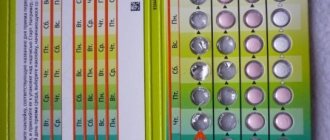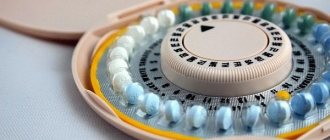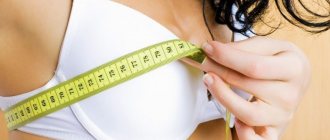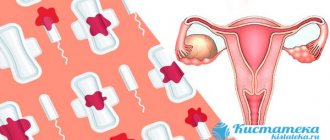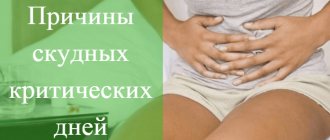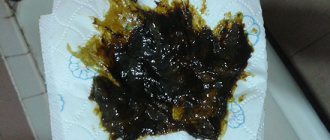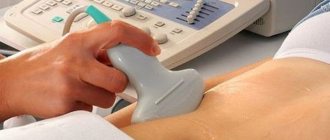A change in the nature of the menstrual cycle during a course of oral contraceptives or after discontinuation is a common phenomenon familiar to many women. New, improved drugs were no exception. It has been noticed that menstruation while taking Jess or after stopping it is noticeably different from the usual cycle. It is natural that such a condition is a cause for concern for representatives of the fairer sex who take this OC. But should we worry if gynecologists reassure us, assuring us that changes in the nature of MC are a natural reaction of the body to the supply of hormones from the outside?
Mechanism of action OK
The main principle of the effect of Jess on a woman’s reproductive system, like any contraceptive, is the creation of unfavorable conditions for conception and the maintenance of pregnancy.
Therefore, the drug contains substances with the properties of hormones that affect the functioning of the ovaries and other processes that ensure fertilization of the egg and gestation of the fetus. Such components of Jess are ethinyl estradiol in the form of betadex clathrate and drospirenone.
Thanks to their combined effects, many biochemical processes are triggered, the most significant of which are suppression of ovulation, thickening of cervical secretions and changes in the structure of the endometrium.
- Unfavorable conditions are created for the maturation of the egg, which prevents its release from the follicle.
- The secretion of the cervix becomes so dense that sperm cannot penetrate through it into the uterine cavity.
- The endometrial layer cannot grow to the thickness at which the fertilized egg attaches.
But the main thing is that the components of the contraceptive disrupt the hypothalamic-pituitary-ovarian cycle, which is responsible for all these processes. Naturally, the body reacts to these processes, and under the influence of Jess, bleeding during MC becomes different.
Features of reception Jess
The contraceptive is designed in such a way that a woman can choose which mode of administration is suitable for her. There are two types of tablets for this. In the first case, it is a set of two types of tablets: active and pacifiers. In the second - a set of only active ones.
Reception in the 24+4 mode is carried out as follows: first, all 24 active pills are taken, then a placebo. During the use of pacifiers, bleeding similar to menstrual bleeding should occur, which is often called menstruation.
The flexible mode involves taking only active pills, there are no pacifiers in the package. A woman can take the pills as much as she needs. You can stop taking it no earlier than the 25th day of treatment and no later than the 120th. If the patient needs to take a break, then it should not last 4 days. After its completion, you should resume taking Jess.
It is recommended to take Jess on the first day of menstruation, with the appearance of bleeding. In this case, the body will be able to properly adjust and get used to the changed hormonal levels. The contraceptive effect of OK begins already with taking the first tablet. but in order for the mechanism to prevent conception and pregnancy to work in full force, it is necessary to take the pills without a break for 7 days. This time is required for the functioning of the hypothalamic-pituitary-ovarian system, which regulates the menstrual cycle, to be suppressed.
If the intake occurs without violations - at the same hours, no missed pills are allowed, then the nature of the MC improves. During the course of Jess, menstruation becomes more regular, the onset of bleeding is normalized, the intensity of discharge decreases, and the manifestations of PMS decrease.
This property of the contraceptive also predetermined its purpose: the drug is recommended to be taken not only to prevent unnecessary pregnancy, but also to eliminate menstrual irregularities.
delay in menstruation when taking jess
Good afternoon ! Ekaterina, 26 years old. Initially, I did not have a normal, clear cycle. Testosterone was increased (hairiness). The uterus is hypoplastic. From 13 to 18 years old I weighed 55-57 kg. This means that for the first time I was delayed for six months at 19 (I lost about 6-8 kg in one year), up to 49-47. I drank Duphaston and rubbed estrogen in the gel, it helped. Then I weighed up to about 52. Everything was more or less normal. In the winter of 2010, my ovaries began to hurt. Then in the summer of 2010 I lost a lot of weight, down to 43... I drank for 3 months in the fall. Diana. My period was coming. Stopped drinking - stopped. Then again there was a delay of about 3 months. (winter-spring 2011). Saw 1 package Primolut - no. Went. And then since May 2011 it hasn’t happened. I took Mastodinon, vitamin E. I only called it after taking Jess in July 2012. I took it for 3 months. Stopped drinking, no. There has been a delay again since November 2012. Ultrasound of the thyroid gland is good.
In the summer of 2010, we tested hormones: _ prolactin 11.89 ng/ml - LH 2.5 mIU/ml - FSH 4.5 - - progesterone 1.51 ng/ml - estradiol - 37.36 - testosterone total. - 2.31 nmol/l (exceeded) Tested here in April 2012: FSH - 3.4 mIU/l LH 2.2 - PROgesterone 11.3 nmol/l Estradiol 35.8 pg/ml testosterone - 3.4 nmol/l DHEA-c 7.9 mcg/ml In 2012, until April, she weighed 45-47. And then she slowly got better. and after summer I weigh 50-52. At this weight I had my period before... Just in case, I’ll clarify about the weight at different times. Simple, it seems to me. Now he doesn’t play a serious role, I’m not so thin anymore. But the fact that I lost a lot of weight then provoked a malfunction... The doctor I contacted said that I had a center disorder. genesis (nervous system). In general. that it's difficult. There are sleep disturbances and anxiety (especially this year). I’m often not in the mood; sometimes I don’t want to smile (especially when I’m tired). Often there is a state of incapacity and drowsiness. (probably like with low blood pressure)… The doctor that year said my symptoms were typical for such a disorder.
Due to increased androgens in recent years, my skin has become very oily (seborrheic dermatitis has developed), hair grows on the chin, cheekbones (naturally, on the nipples, bikini area). In June, large pimples appeared on my cheekbones. And after the end of Jess’s treatment (in October, November 2012). ORDER No.: 04D1-945B-644184552 CUSTOMER: LLC "Zdorovye" Place of collection of biomaterial: 10578 - LP on Nevsky, 136 Age: 26 years old PATIENT: Last name: NEROVICH Sample No.: EX-01-150313-01539 1057800000002845 Average portion morning urine 15.03 .2013 11:57:10 03/15/2013 15:44:26 03/15/2013 19:38:50 Name/indicator Value Reference values * General urine test Reaction 6.5 5.0 - 7.5 Bilirubin not detected or not detected in small quantities Specific gravity 1.025 1.005 - 1.025 Protein not detected no more than 30 mg/dl Glucose not detected not detected Urobilinoids 0.2 U/dl 0.2 - 2.0 Ketones not detected no more than 15 mg/dl nitrites not detected not detected Reaction to blood not detected not detected or traces Leukocytes not found not found or traces Microscopy of urine sediment Color from light yellow to amber yellow straw yellow Odor faint mild specific specific Transparency transparent transparent Epithelium: flat (in visual field) 1-2-3 0 - 5 Epithelium: transitional ( in field of view) 0 0-1 in field of view Epithelium: renal (in the field of vision) 0 absent Leukocytes (in the field of view) 3-2-3 M - 0-2 in the field of view; F - 0-4 in P.S. Red blood cells: unchanged (in field of vision) 0-0-1 0-4 in field of vision. Red blood cells: changed (in p.s.) 0-0-0 absent Salts no no Bacteria no no Yeast-like fungi no no Mucus 1+ to 1+ Report created: 03/15/2013 19:41:16 ORDER No.: 623E-3629- 198803437 CUSTOMER: Helix Nord-West LLC Place of collection of biomaterial: 10963 - DC on Karpovka Age: 26 years PATIENT: Last name: NEROVICH EKATERINA Gender: Female Sample No.: EX-01-250213-06423 1096300000009844 Venous blood 25.0 2.2013 19: 0.80 — 1.76 Antibodies to thyroglobulin Concentration * — Reference values are given taking into account age, gender, phase of the menstrual cycle, and gestational age. Report created: 02/25/2013 23:25:26 March 2012 DHA-S 7.4 M echo 0.3 Dominant follicle 2 cm How to regulate menstruation????
The nature of menstruation and Jess
The quality of menstruation changes under the influence of a contraceptive, so many women find it difficult to determine what is considered normal and what is not. Tablets have an effect on each organism in its own way, because many factors are determined by individual characteristics: age, concomitant pathologies, diseases, exposure to stress. Therefore, only the treating gynecologist can more accurately determine whether the discharge after Jess is normal or not.
Otherwise, we can only consider the most typical changes in menstruation during or after discontinuation of Jess.
Doctors' answers
1. Taking oral contraceptives is possible from the first day of menstruation (in this case there is no need for additional protection); it is also possible to start taking them on the 2nd–5th day of the menstrual cycle, but in this case it is recommended to additionally use an additional method of contraception during the first 7 days of taking the pills from the first package. There is no need to start taking OCs 7 days after the end of your period; it is pointless, since there will be no contraceptive effect. 2. You can 3. They do not have a very high contraceptive effect, therefore, suppositories are not recommended for use in young couples.
Jess is a combined modern monophasic preparation of oral contraceptives. Contains drospirenone and ethinyl estradiol. Protection against pregnancy is achieved by suppressing ovulation, changing the quality of mucus in the cervix, and the properties of the endometrium. Jess can also have a healing effect for PMS: eliminating mood swings and emotional background; with it there is no enlargement and pain in the chest, no heaviness in the head. Drospirenone reduces the appearance of acne, oily skin and hair.
There are 28 tablets in a package. If the options are for three menstrual cycles at once, in this case one package contains 84 tablets. Composition of the drug Jess:
- The first 24 tablets are active with hormonal components, taken during the first 24 days of the cycle;
- The last 4 tablets are pacifiers, do not contain an active component, and the drug Jess Plus contains a metabolite of folic acid.
The basic rules for taking the pills are as follows: start taking pills from the first day of the cycle, with the onset of any spotting, if pregnancy is excluded; take a tablet every day at exactly the same time for 28 days; as soon as the package is finished, the next one should be started without any interruption, regardless of whether there is bleeding or not; if the package contains 84 tablets, then they must be taken continuously.
Jess in a flex cartridge with a Click dispenser
The use of Jess also involves taking only active tablets. In this case, you need to drink only the first 24, after which you immediately start a new package. Menstruation will not come until the girl takes pacifier pills. The maximum period without menstruation is up to 120 days without bleeding, after which you should take a break for menstruation.
For most women, change their character while using the pills The features are as follows (subject to strict adherence to the rules for taking pills):
- your period comes exactly on the day of the week when the first pill was taken;
- spotting begins on the 2-3rd day of taking inactive tablets;
- menstruation is spotty, sometimes panty liners are enough;
- Menstruation often becomes less painful.
During the first two or three cycles, a woman may notice periodic acyclic spotting. You should not worry, this is an adaptation of the body, which should normally take place with long-term use.
As a rule, in women who take Jess, menstrual-like discharge becomes regular even if previously they were at large or too short intervals, but only if the drug was correctly selected.
Normally, spotting or even moderate spotting is allowed outside of menstruation during the first three months. If this continues for a longer period of time, you should consult a doctor to decide on changing the drug or changing the dosage regimen.
The following violations are possible: menstruation arrived while still on active tablets (it is better to continue taking it; but if there are more than 6-8 tablets left in the package, and menstruation has already begun, and this repeats from month to month, you should consult a doctor); there are no periods, but all the pills have been taken (allowed for three cycles); periods are smeared for a long time - up to a week or even more; no changes (the woman does not respond to the drug, a replacement is necessary).
Read more in our article about taking the drug Jess and the features of menstruation with it.
Read in this article
When does menstruation occur after Jess?
Menstruation usually occurs while taking a placebo or during a break - 2-4 days after the last inactive pill. Placebos do not contain hormones; taking them serves as a signal to the body about the onset of withdrawal bleeding.
The process usually takes 4-5 days, provided that the first tablet was taken immediately after the start of MC. Your period may not end until you resume taking active pills, which is normal. Therefore, it is necessary to resume taking active OK tablets immediately after finishing all placebo pills. In this case, bleeding when taking Jess will begin every month on the same days.
If a woman has not taken any OCs before, then in the first month of taking Jess the body will get used to the effects of synthetic hormones. When the process proceeded without outside intervention, critical days occurred under the influence of the growth of LH and FSH, as well as under the influence of estrogens, which regulate the condition of the endometrium. But ingestion of hormonal drugs changes the nature of MC, so discharge when taking Jess may be as follows:
- Scarce. This is considered normal, since under the influence of OCs the endometrium does not grow as before, and therefore the volume of rejection is not large. In addition, if menstruation was not heavy before Jess, then after taking the pills spotting is usually observed.
- Brown discharge. Under the influence of hormones, blood viscosity increases, so it clots faster and is susceptible to oxidation. Discharge of this color is usually observed after sleep or a long horizontal position. As a result, their emergence to the surface is difficult.
- Discharge in the middle of the cycle. The so-called spotting is typical at the beginning of taking a contraceptive, usually manifests itself in the first 2-3 months. It doesn’t indicate anything bad, but is the body’s reaction to OK. After its adaptation is completed, the MC will normalize and intermenstrual bleeding will stop. Therefore, you should not give up Jess, but you should continue to take the pills as prescribed. Moreover, sudden cessation of use can provoke breakthrough bleeding.
How jess changes menstruation
Jess is able to make your first periods different from what was observed before you started taking it. Without external influence, menstruation occurs with an increase in FSH and LH, which stimulate the work of the ovaries and the development of the germ cell, as well as estrogens and progesterone, which ensure the growth of the mucous surface inside the uterus. This is what changes in the process look like, which are caused by the use of a contraceptive:
- Jess makes scanty periods possible for the vast majority of women. Its active substance inhibits the functioning of the ovaries throughout the entire cycle, which interferes with the production of hormones. The endometrium in the middle of the menstrual period also does not thicken or become porous, as happens when not taking birth control pills. That is, when the moment of tissue rejection of the uterine mucosa comes, there are noticeably fewer of them than always;
- Another feature that jess gives to critical days is brown periods. The drug has the ability to increase blood viscosity. As a result, it coagulates and oxidizes faster while inside the uterus or vagina. Brown discharge is more often observed after a night's sleep and a long stay in a lying position, when it has less opportunity to come out;
- A circumstance that may alarm a woman taking Jess is discharge after menstruation. This does not indicate anything dangerous when observed in the first 2-3 cycles from the start of using the drug. This is an adaptation reaction of the reproductive system that does not require stopping the use of jess. On the contrary, abrupt withdrawal of the drug can provoke the spotting to turn into full-fledged bleeding.
Jess and PMS
Already the first menstruation after jess is characterized by a decrease in the negative manifestations of PMS:
- The skin becomes less oily. The hormones in the drug have the ability to suppress androgens in a woman’s body, which lead to greasiness of the epidermis and the appearance of acne. Girls in adolescence are prescribed this drug for this very purpose;
- Pain syndrome is reduced. The components of jess reduce the contractile function of the uterine walls. Due to this, pain in the abdomen and lower back also subside;
- Swelling is eliminated. Menstruation while taking Jess does not cause as many problems as before, thanks to the corticoid suppressing properties of the steroid drospirenone. It is the first ones that retain liquid.
The absolute effect of reducing severe manifestations of PMS may not occur from the very first period of using jess. In a month or 2-3, the body will adapt to its new mode of operation. The more actively the ovaries functioned, the longer the addiction will last. It is important that there are no unbearable sensations that have not appeared before.
Timing of menstruation
The length of the cycle is different for all women, but the drug brings it to a general indicator. To understand when your period begins when taking Jess, you need to know that the standard package is designed for daily use of the pill for 28 days. The first 24 pieces contain the same amount of hormones. The last 4 have a reduced volume of substances, they are drunk at the end. This is a withdrawal syndrome that provokes the use of jess when menstruation begins, depending on the smallest amount of hormones in the blood. The usual period is 3-4 days of taking inactive tablets.
Some women taking Jess do not have their periods at all. This is considered as the norm, especially if menstruation was not heavy before. The drug has a depressing effect on the functioning of the ovaries, which can cause a complete absence of discharge on the expected days. There are other explanations for the absence of menstruation at a certain time:
- When a woman constantly keeps in her head “I drink jess - no periods,” perhaps it is not a hormonal factor that is to blame, but stress. Excitement and fear, no worse than any illness or medication, can delay critical days;
- Another reason why menstruation has stopped with jess is alcohol. It reduces the concentration of hormones if drunk in significant quantities, and the girl is thin. Even in the absence of conception, at the end of the cycle there may not be a sharp decrease in the level of substances, which means that menstruation is a prerequisite.
If Jess has lost her period for 1 cycle, you can safely start taking the next package of birth control. Their absence even after using the second blister requires a trip to the doctor to clarify the situation.
Why don't you have periods?
It often happens that after taking Jess pills, menstruation may stop completely. Explanations for this phenomenon may be the following:
- The absence of menstruation is considered normal in those women for whom they were not already intense. OK suppresses the work of the ovaries, which affects the absence of bleeding.
- Psychological factor. If a woman who has started drinking OK is fixated on the onset of menstruation, constantly thinking “I drink Jess, and therefore I don’t have periods,” then the time of their onset will move away. It is known that the psychological factor, the internal pressure, can influence the processes occurring in the body.
- The influence of alcohol. Ethanol-containing drinks or medications can reduce the concentration of hormones in the body and thereby interfere with the action of OCs.
- Pregnancy. This is usually unlikely if the patient took the pills carefully. But if it happens that there is no menstruation while taking Jess, then fertilization of the egg may have occurred. This happens if the conditions of administration are not met: frequent omissions of OCs, neglect of additional means of protection such as condoms, and also if the content of the contraceptive in the body has not been restored after vomiting or diarrhea. In any case, it is better not to delay visiting the doctor.
It should be remembered that if after taking Jess there are no periods during the first cycle of use, then you don’t have to worry about their cause and continue to take the pills. But if the delay is prolonged, then an examination by a gynecologist will be required to find out what is happening.
Periods after stopping Jess
After stopping taking hormonal contraceptives, the functioning of the reproductive system should be restored immediately. But after prolonged use of OCs, the ovaries, pituitary gland, and hypothalamus need time to begin producing sex hormones again.
Sometimes Jess is prescribed for 3-6 months to treat infertility. When discontinuing hormones that the patient has been taking for a short time, the ovaries should begin to work more actively. During the first 3 cycles after discontinuation, the likelihood of ovulation and pregnancy increases.
When planning a pregnancy, Jess+ is often prescribed. This is a similar contraceptive, which in addition to hormones also contains folate - a substance that saturates the woman’s body with folic acid. If you don’t have your period while taking Jess Plus, then you need to choose another method to normalize ovarian function.
Restoring the natural cycle
It will take some time for menstruation to return to its natural form after discontinuation of Jess. The body must get used to the absence of incoming hormones. Therefore, in the first months after giving up OCs, you need to prepare for the fact that the nature of the MC will be unstable: longer (up to 7-9 days) and intense.
The adaptation process will be much smoother if you think about canceling OK in advance. If there is no need to abruptly stop taking OCs, then it is better to finish the pills until the end, and then do not resume taking them.
How to change MC with tablets
If necessary, a woman can independently influence the start time of MC. To do this, manufacturers advise:
If the patient takes OK according to the 24+4 regimen, then after finishing the active pills from one blister, immediately start with a new one. It is recommended to discard the placebo to avoid causing confusion. Taking pills is allowed for as long as needed. This method helps prolong the onset of bleeding. If you drink two packs of OK, then, on average, the bleeding will be delayed by 3 weeks. If a more rapid onset is necessary, it is necessary to interrupt treatment earlier and maintain a 4-day interval. Then bleeding will occur on the 2nd or 3rd day of withdrawal. After the end of the break, they begin taking OK again. Possible spotting that appears during the second plate is considered normal.
If there is a need to postpone the start of MC to another day of the week, then in this case it is necessary to reduce the amount of placebo by the required number of days and move on to the next active batch of pills. It should be taken into account that withdrawal bleeding will not develop, and when using a new package, spotting or breakthrough phenomena will appear.
To change the onset of MC with a flexible regimen of taking OCs, the patient is advised to interrupt the course for a 4-day break, during which bleeding should occur. But even if it does not occur, after its completion it is necessary to resume the Jess course. With a longer interval, contraceptive protection decreases, as the hormone content required for this decreases.
Features of Jess Plus action
The drug has the same contraceptive effect as Jess. But unlike it, Jess Plus tablets are additionally fortified with one of the forms of folic acid. Therefore, the contraceptive is well suited for those women who are thinking about motherhood. In case of conception, the contained vitamin will protect the embryo from the negative effects of hormones and prevent the development of neural tube pathology in the fetus. Otherwise, the manifestation of bleeding while taking Jess Plus is identical.
Jess is deservedly considered one of the best modern means of contraception. If it is prescribed correctly, taking into account all possible contraindications, then, in addition to protecting against unnecessary pregnancy, OC will help cope with irregular cycles and intense bleeding. But, like any medication, its use must be constantly monitored. Therefore, if you have doubts about the nature of your menstruation during or after taking it, you should definitely visit a doctor’s office.
